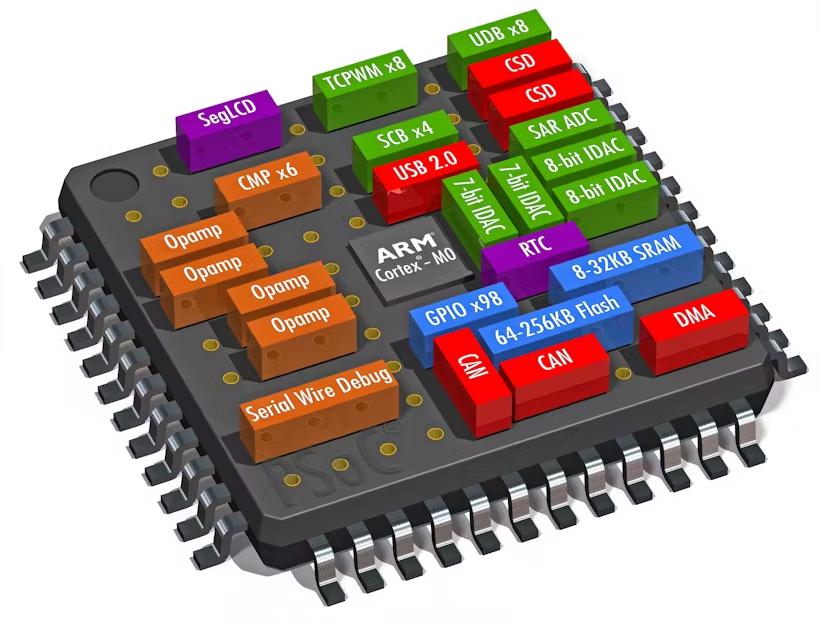STM32 Microcontroller Series: Features, Advantages, and Selection Guide
In embedded system development, microcontrollers (MCUs) are crucial. As technology advances, requirements for MCU performance, power consumption, and integration rise. STMicroelectronics (ST), a top semiconductor supplier, has gained prominence in embedded development with its STM32 series MCUs, known for high performance, low power consumption, rich peripherals, and a robust ecosystem. These MCUs are widely used in industrial control, consumer electronics, smart homes, automotive electronics, IoT, and more.
ST and STM32 Series Introduction

STMicroelectronics (ST) is a globally renowned semiconductor manufacturer headquartered in Geneva, Switzerland. Founded in 1987 through the merger of Italy's SGS Microelettronica and France's Thomson Semiconducteurs, ST has grown to employ around 46,000 people globally, serving diverse industries with product lines including analog chips, digital chips, sensors, power devices, and microcontrollers.
The STM32 series, developed by ST using ARM Cortex-M cores like Cortex-M0, Cortex-M3, Cortex-M4, and Cortex-M7, is a 32-bit microcontroller lineup. These cores, with their 32-bit instruction sets, deliver high-speed processing. The STM32 series integrates rich peripherals such as GPIO, USART, SPI, I2C, ADC, DAC, timers, PWM, Ethernet, and USB controllers, catering to various application needs. For instance, the Cortex-M4 in the STM32F4 series, based on the 32-bit ARMv7E-M architecture with a single-precision FPU, can reach up to 180MHz, suitable for motor control and digital signal processing requiring efficient math operations.
Core Technology Analysis of STM32 Series
● High Performance: Equipped with high-performance ARM Cortex-M cores, optimized instruction sets, and high clock frequencies for efficient data processing.
● Low Power Consumption: Ideal for battery-powered and energy-saving applications, featuring multiple low-power modes like standby, sleep, and stop to minimize power use without sacrificing functionality.
● Rich Peripherals and Functions: Offers extensive peripherals and features to meet diverse application needs.
● Robust Development Tools and Ecosystem: ST provides comprehensive tools and resources, including IDEs, debuggers, emulators, development boards, and software libraries. STM32CubeMX simplifies hardware configuration and peripheral control via HAL and LL libraries.
● Application Scenarios: Widely used in industrial control (automation equipment, PLCs, smart sensors), automotive electronics (body control, infotainment, in-vehicle networks), consumer electronics (smartwatches, digital photo frames, voice assistants), smart homes (smart locks, lighting controls), and IoT (wireless sensors, environmental monitoring).
Popular and Representative Models of STM32 Series
Model | Core | Clock Speed | Flash Memory | SRAM | Features and Applications |
Cortex-M3 | 72MHz | 64KB | 20KB | General-purpose MCU for embedded applications like motor control and sensor data collection. | |
Cortex-M4 | 168MHz | 1MB | 192KB | With FPU, suitable for applications requiring efficient math operations, such as audio processing and motor control. | |
Cortex-M7 | 480MHz | 1MB | 512KB | High-performance MCU capable of running a lightweight Linux system, suitable for applications with high computing demands like industrial machine vision and smart retail terminals. | |
Cortex-M4 | 80MHz | 512KB | 160KB | Low-power MCU for battery-powered devices like heart rate monitors and blood glucose meters. | |
Cortex-M4 + Cortex-M0 | 64MHz + 32MHz | 1MB | 256KB | STM32WB Series, Dual-core architecture with Bluetooth 5.0 and Zigbee integration, suitable for smart home gateways and other wireless communication applications. | |
Cortex-M33 | 32MHz | 64KB | 16KB | Ultra-low-power MCU with near-threshold design, suitable for low-power applications like human presence detection, industrial anomaly detection, and flow meters. |
Competitive Alternative Product Analysis
While the STM32 series is excellent, other vendors offer competitive products. Developers can consider the following alternatives based on project requirements:
1. Texas Instruments (TI):
● MSP430 Series: 16-bit ultra-low-power MCU for battery-powered devices like low-power sensors and medical electronics.
● TM4C Series: Based on the ARM Cortex-M4 core, suitable for applications requiring higher performance, such as motor control and industrial automation.
● LPC Series: Based on ARM Cortex-M0, Cortex-M3, Cortex-M4 cores, with rich peripherals and low-power features for various embedded applications.
● Kinetis Series: Based on ARM Cortex-M4, Cortex-M7 cores, suitable for applications requiring high performance and rich functionality, such as automotive electronics and industrial control.
● PIC32 Series: 32-bit MCU based on MIPS architecture for applications requiring high performance and low power consumption.
● ATSAM Series: Based on ARM Cortex-M0, Cortex-M3, Cortex-M4 cores, suitable for various embedded applications.
4. Espressif:
● ESP32 Series: MCU with integrated Wi-Fi and Bluetooth capabilities for IoT applications like smart homes and wireless sensors.
Selection Suggestions
With the development of IoT, AI, and other technologies, microcontrollers will play important roles in more fields. When selecting a microcontroller, developers are advised to consider:
1. Clarify Requirements: Key indicators like performance, power consumption, peripherals, and cost.
2. Evaluate Ecosystem: Development tools, software libraries, community support, etc.
3. Consider Long-Term Availability: Product lifecycle and supply stability.
4. Security Needs: Whether hardware-level security features are required.
5. Wireless Functionality: Whether wireless connectivity is needed.
For most application scenarios, the STM32 series offers suitable solutions. Its robust ecosystem can significantly shorten development cycles and reduce risks. For specific needs (such as ultra-low power consumption, wireless integration, or special peripherals), the mentioned alternatives can be assessed.
Conclusion
The STM32 series of microcontrollers, with their high performance, low power consumption, rich peripherals, and comprehensive ecosystem, are widely used in embedded development. Their various sub-series and models cater to diverse application needs, from low-power battery-powered devices to high-performance industrial control and IoT applications. Other vendors also offer alternative series, allowing developers to choose the right MCU based on specific requirements and budgets. As technology advances, MCU performance and functionality will continue to improve, providing stronger support for the development of embedded systems.
Website: www.conevoelec.com
Email: info@conevoelec.com








